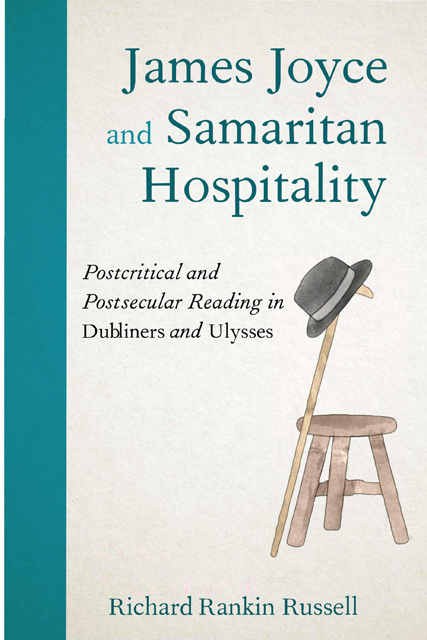Book contents
- Frontmatter
- Contents
- Preface and Acknowledgments
- List of Abbreviations
- Introduction
- 1 Haunted by Hospitality in “The Dead”
- 2 Joyce, Scripture, and Autobiographical Rescue Narratives
- 3 Rewriting the Good Samaritan Parable: The Fictional Rescue Narratives of “Grace” and “Circe”
- 4 Bloom as Stranger and Samaritan in “Cyclops,” “Oxen of the Sun,” and “Circe”
- 5 “In orthodox Samaritan fashion”: The Parabolic Encounter between Stephen and Bloom in “Eumaeus”
- 6 Home to “Ithaca” and “Penelope”: Bloom’s Hospitality and Stephen and Molly’s Reactions
- 7 Enfleshed Ethics and the Responsibility of the Reader in the Good Samaritan Parable and the “Nostos” of Ulysses
- Coda: “Go thou and do likewise”: Postcritical and Postsecular Reading through a Joycean Hermeneutics of Hospitality
- Works Cited
- Index
6 - Home to “Ithaca” and “Penelope”: Bloom’s Hospitality and Stephen and Molly’s Reactions
Published online by Cambridge University Press: 25 April 2023
- Frontmatter
- Contents
- Preface and Acknowledgments
- List of Abbreviations
- Introduction
- 1 Haunted by Hospitality in “The Dead”
- 2 Joyce, Scripture, and Autobiographical Rescue Narratives
- 3 Rewriting the Good Samaritan Parable: The Fictional Rescue Narratives of “Grace” and “Circe”
- 4 Bloom as Stranger and Samaritan in “Cyclops,” “Oxen of the Sun,” and “Circe”
- 5 “In orthodox Samaritan fashion”: The Parabolic Encounter between Stephen and Bloom in “Eumaeus”
- 6 Home to “Ithaca” and “Penelope”: Bloom’s Hospitality and Stephen and Molly’s Reactions
- 7 Enfleshed Ethics and the Responsibility of the Reader in the Good Samaritan Parable and the “Nostos” of Ulysses
- Coda: “Go thou and do likewise”: Postcritical and Postsecular Reading through a Joycean Hermeneutics of Hospitality
- Works Cited
- Index
Summary
Bloom’s Continuing Samaritan Hospitality to Stephen
Regardless of whether we accept Margaret McBride’s auto-fictive account, “Ithaca” continues the events originally iterated in Christ’s parable but with a twist: it rewrites the end of the parable when Bloom leads Stephen to his own home, not an inn or hotel like the Good Samaritan did. The Good Samaritan took the beaten stranger to an inn and paid “two denarii,” which “would provide approximately two months of lodging in an ancient inn.” Yet Bloom goes beyond that hospitality to invite Stephen into his own home and truly make him a neighbor, an act of excessive generosity. Certainly, Bloom wants him to meet Molly and perhaps for him to sing with her eventually, but he is most concerned to care for Stephen.
“Starting united” (U 17.2), the two men wander toward 7 Eccles Street, and Bloom’s inviting Stephen into his home constitutes an extension of his enfleshed care for the young man. Edward Casey has pointed out that because we have such “increasingly intimate relationships with their material structures, the longer we reside in places, the more bodylike they seem to be. As we feel more ‘at home’ in dwelling places, they become places created in our own bodily image.” Recall the opening of “Calypso,” the first episode in the novel in which we meet Bloom. This thoroughly embodied man is preparing his wife’s breakfast and is completely at home in his kitchen and house generally. As he wanders home from the butcher’s shortly afterwards, the kidney he will soon eat in his pocket, he recoils from what seems like a gray and shrunken world and longs for the embodied world of his home: “To smell the gentle smoke of tea, fume of the pan, sizzling butter. Be near her ample bedwarmed flesh. Yes, yes” (U 4.237–9). Molly’s concluding affirmations at the end of the novel have rightly garnered more attention, but Bloom’s affirmation of his home as an extension of his body—a comfortable and enfleshed place of food and Molly’s flesh—deserves more attention and suggests strongly what a generous offer he makes to Stephen when he invites him home in “Eumaeus,” then hosts him in “Ithaca” in his continuing role of Good Samaritan.
- Type
- Chapter
- Information
- James Joyce and Samaritan HospitalityPostcritical and Postsecular Reading in Dubliners and Ulysses, pp. 160 - 179Publisher: Edinburgh University PressPrint publication year: 2023



